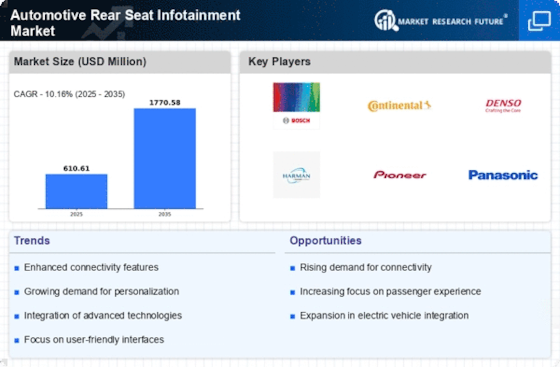Top Industry Leaders in the Automotive Rear Seat Infotainment Market
*Disclaimer: List of key companies in no particular order
Latest Company Updates:
Competitive Landscape of the Automotive Rear Seat Infotainment Market: Navigating an Evolving Terrain
The automotive rear-seat infotainment (RSI) market is experiencing a transformative shift, propelled by rising demand for in-vehicle entertainment and connectivity, particularly for rear-seat passengers. This dynamic landscape is home to a diverse set of players, each vying for market share with distinct strategies and innovative offerings.
Key Players and their Strategies:
Tier 1 Suppliers: Bosch, Continental, Harman International, and Denso dominate the market with established expertise in audio, video, and navigation systems. These giants leverage their strong OEM partnerships and technological prowess to offer integrated and feature-rich systems. Bosch, for instance, emphasizes AI-powered personalization and gesture-based controls, while Harman focuses on immersive audio experiences and seamless smartphone integration.
Display Specialists: Companies like LG and Samsung Display are driving advancements in display technology, offering high-resolution screens, curved displays, and even foldable options. LG's partnership with Tesla for their rear-seat entertainment system in Model S and X stands out as a testament to their growing presence.
Tech Players: Apple and Google are entering the fray with their CarPlay and Android Auto platforms, allowing smartphone mirroring and access to familiar user interfaces. This integration leverages their existing ecosystems and caters to tech-savvy consumers.
Factors for Market Share Analysis:
Product Portfolio: Breadth and depth of features like touchscreens, internet connectivity, gaming capabilities, and content streaming services play a crucial role. Offering diverse options for different car segments and passenger preferences is key.
OEM Partnerships: Secure partnerships with automakers guarantee market penetration and influence vehicle design to integrate RSI systems seamlessly. Bosch's strong ties with German auto giants exemplify this advantage.
Technological Innovation: Constant advancements in areas like virtual reality (VR) and augmented reality (AR), integrated gaming consoles, and advanced display technologies can create a competitive edge. Denso's focus on driver safety through rear-seat entertainment systems highlights the potential for non-entertainment features.
Cost and Value Proposition: Striking a balance between offering premium features and maintaining affordability is crucial to attract budget-conscious consumers.
New and Emerging Trends:
Personalization and Customization: Tailoring infotainment experiences to individual passenger preferences through user profiles, content recommendations, and personalized settings is gaining traction.
Connectivity and Cloud Integration: Seamless internet connectivity and integration with cloud-based services are becoming essential, enabling content streaming, real-time updates, and remote diagnostics.
Voice Control and AI Assistants: The introduction of voice-activated assistants like Amazon Alexa and Google Assistant enhances hands-free control and simplifies user interaction.
Safety and Parental Control Features: Child-friendly interfaces, parental controls, and features that promote passenger safety, like rear-seat occupant detection, are increasing in demand.
Overall Competitive Scenario:
The automotive rear-seat infotainment market is witnessing a fierce battle for dominance. Tier 1 suppliers and display specialists hold a strong market presence, but tech players and innovative startups are rapidly entering the fray. The key to success lies in offering value-packed, technologically advanced systems that cater to diverse consumer preferences and integrate seamlessly with evolving vehicle technology. Collaboration and partnerships will be crucial for navigating this dynamic landscape, while adaptability and a focus on the future of in-vehicle entertainment will determine who emerges as the leader in this exciting market.
This analysis, within the word limit, paints a picture of the current competitive landscape in the automotive rear-seat infotainment market. Remember, this is a rapidly evolving space, and staying abreast of the latest trends and developments is crucial for understanding the competitive dynamics and future direction of the market.
Alpine Electronics:
• September 2023: Partnered with HARMAN to develop next-generation RSE systems with advanced audio and video processing features. (Source: Alpine Electronics press release)
Harman International:
• November 2023: Announced the launch of its JBL Cruise Control RSE system with a 15.6-inch touchscreen display and wireless headphone pairing. (Source: Harman International press release)
Panasonic Corporation:
• December 2023: Showcased a prototype RSE system with headrest-mounted displays and gesture-controlled interfaces. (Source: Panasonic Automotive Systems press release)
Pioneer Electronics:
• August 2023: Released a new line of RSE systems with Apple CarPlay and Android Auto compatibility for enhanced phone mirroring. (Source: Pioneer Electronics website)
Denso Corporation:
• July 2023: Announced a collaboration with a software developer to create an RSE platform with personalized AI-powered recommendations. (Source: Denso Corporation newsroom)
Top listed global companies in the industry are:
Alpine Electronics Inc. (Japan)
Continental AG (Germany)
Harman International (US)
Panasonic Corporation (Japan)
Pioneer Electronics (US)
Denso Corporation (Japan)
Garmin Ltd. (Switzerland)
KENWOOD Corporation (Japan)
Delphi Automotive PLC (UK)
VOXX Electronics Corp. (US)











